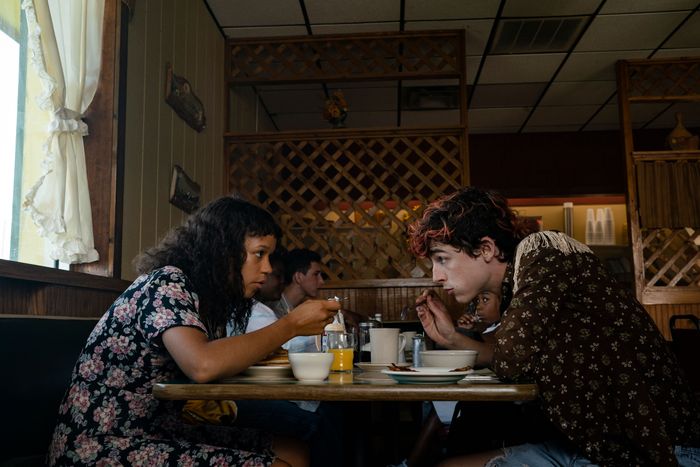
When it came time to finagle financing for the high-brow yet shocking, engrossing yet gross YA-cannibal-road-romance Bones and All, director Luca Guadagnino knew that Hollywood would not in all likelihood have the requisite taste for flesh. Despite having attached his muse-slash-sharp-cheekboned face of a generation Timothée Chalamet as co-star and producer on the project, the BAFTA and Golden Globe–winning Italian auteur — whose 2017 breakthrough Call Me By Your Name landed a Best Picture Oscar nod — understood that Bones would be a hard sell at the increasingly risk-averse studio level because of how it co-mingled art house and grind house. That is to say, the film showcases literal blood lust, finger gnawing, and gruesome human carnivory against a backdrop of exquisite, post-adolescent longing; it’s an intimately observed journey of self-discovery — hardly the kind of project Hollywood usually clamors for.
So in the final weeks of 2020, Guadagnino began seeking Italian backers who “shared his vision” for his first American-set movie. The director’s first call: Lorenzo Mieli, the prolific Rome-based television producer behind such HBO series as the Jude Law papal romp The Young Pope, the cabler’s prestige adaptation of Elena Ferrante’s best-selling Neapolitan novels My Brilliant Friend, and the Italian-set coming-of-age drama We Are Who We Are, for which Guadagnino had previously served as director and showrunner. As chief executive of the Italian production company the Apartment, a boutique division of the global media behemoth Fremantle, Mieli had never backed a theatrical motion picture. But he teamed with Francesco Melzi d’Eril (a producer on Guadagnino’s Amazon Studios horror adaptation Suspiria) and Marco Morabito (who co-produced Call Me By Your Name) to front Bones and All’s $20 million production budget.
“For the eccentric topic of the movie, it would have been very hard to convince a studio,” Mieli tells Vulture. “For a topic like cannibalism, how much do you want to show the violence? Is it going to be a metaphorical journey — a love story like we want it to be? Or is it going to be too hard? And can we make it independently? The process is going to be very, very long; it needs a lot of attention and not stress because it is very delicate.”
That investment paid off with one of awards season ’22’s strangest entries: an odd but acclaimed, buzzy yet niche adaptation of Camille DeAngelis’s 2015 YA novel by one of Europe’s preeminent filmmakers. A guy who has had every opportunity to go gonzo Hollywood — it’s fair to reason Guadagnino could have traveled the Denis Villeneuve route, parlaying his art-house renown into a studio movie with a nine-figure budget — but who chose instead to keep production on his seventh directorial feature deliberately small scale and defiantly indie. MGM bought Bones and All sight unseen, acquiring its North American distribution rights last year (in a deal known as a negative pickup) on the strength of a nine-minute sizzle reel Guadagnino cobbled together before the movie was finished (Warner Bros. picked up Bones’ foreign rollout with the exception of Italy, where the film is being handled by Vision Distribution).
The ’80s-set horror romance premiered to a ten-minute standing ovation at the Venice International Film Festival in September, where Guadagnino claimed the Silver Lion Award for Best Director and co-lead Taylor Russell was handed a Marcello Mastroianni Award for Best Young Actor. From there, Bones bowed at other major fests, including Telluride, the London Film Festival, and the New York Film Festival, further burnishing its Gold Derby worthiness (in conjunction with an autumn For Your Consideration blitz by MGM — although in this case, FYC could just as easily be read as Fine Young Cannibals). Bones and All finally reached wide release around Thanksgiving weekend — its entry to the movie marketplace marked by nearly six and a half million fan-generated TikTok videos and a hive of Chalamet-inspired buzz — to mostly positive reviews but lackluster ticket sales.
To date, Bones has claimed a mere $6.1 million worldwide, seemingly the latest victim of a post-COVID, post–Labor Day box-office malaise that has resulted in sluggish grosses for many of awards season’s most ballyhooed titles. Among them: Tár ($5.1 million globally), She Said ($6.7 million), Till ($8.7 million), and The Fabelmans ($3.6 million in limited release). Unlike those films, however, Bones and All’s distributor MGM is owned by Amazon, which employs different metrics than the studios to determine box-office failure and is positioning the movie to signal its intent to “take creative, big swings,” according to an insider.
Mieli — who is rapidly increasing his profile within Hollywood’s 30-mile zone as a producer of such splashy upcoming projects as the Sofia Coppola Elvis biopic Priscilla, the Apple TV+ series Ferrari, and the Pablo Larrain–directed, Angelina Jolie–starring biographical drama Maria — nonetheless feels gratified to have enabled Guadagnino to make the movie he wanted, even if that wasn’t what Hollywood was looking for: a character-driven genre fusion that avoids genre tropes and blurs the lines surrounding both love stories and frightening films. “He didn’t want to make a horror movie. He didn’t want to make — how do you say it? — an intellectual movie,” the producer says. “He wanted to make a movie where you could empathize with the characters. Where you see them find love, where you see them find acceptance, but it can also mean destroying and being destroyed. And nonetheless. The movie pulls out that feeling — that feeling of hope.”


